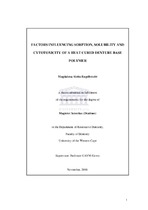| dc.description.abstract | Objectives:Substances leaching from denture- base polymers have been associated with cytotoxicity and allergic reactions. This study examined the effect of polishing,mixing ratios, water immersion temperatures and different thicknesses on the sorption and solubility of a heat-polymerized, denture-base polymer. The effect of different water immersion temperatures on the flexural strength of the denture base, was tested as well. The next component of this study, is the testing of the most significant sorption and solubility findings on in vitro cell viability.
Materials and Methods:Disc shaped specimens from a heat-polymerized, denture-base polymer (Vertex®) were prepared, based on ISO 1567 specifications for sorption and solubility testing, following the manufacturers’ instructions. The following tests were performed: 1) Sorption and solubility of two groups (n = 12 each) of polished and unpolished discs were established and compared by means of the Mixed procedure; 2) Sorption and solubility of three groups (n = 12 each) with different mixing ratios were compared by means of the Mixed procedure; 3) Four groups (n = 14 each) were immersed in water at different temperatures, sorption and solubility were compared by means of pairwise comparison and the Median test; 4) Specimens with different thicknesses (n = 36) were compared, again, by means of pairwise comparison and the Median test; 5) To test the influence of different water-soaking temperatures on the flexural strength of the disc, strips were prepared from the disc used in test no. 3. The flexural strength was compared, by means of the Median test; 6) To test the influence of no postpolymerization treatment, polishing and water immersion on the cytotoxicity of
mouse fibroblast cells, (n = 9) for each test group, were prepared. A preliminary
test was performed beforehand, over a period of 24 hours, up to a maximum period of four weeks. The Balb/c 3T3 mouse fibroblast cells were cultured and
incubated for 24 hours in Eagles medium. Eluates prepared from the disc and
medium without any disc (control) replaced the medium. Cytotoxicity was
assessed by MTT-assay. Optical density values were obtained at 24 and 48 hour
intervals. The data was analyzed by means of the Means procedure.Results:In the entire thesis, the data was analyzed using SAS on a 0.01 probability level.Between polished and unpolished groups, no significant difference in water sorption (p> 0.01) was found, but there was a difference in solubility (p<0.01).Different mixing ratios did not alter sorption (p = 0.34) or solubility (p = 0.68).However, a difference (p<0.01) in sorption and solubility was found among the different temperature and thickness groups. Soaking the denture base in water at different temperatures did not alter its flexural strength (p = 0.48). Cell viability levels were noted in all the experimental groups in the MTT assay test. The analysis was a two-factor study, with one factor being the group, and the other, being time. The interaction between these factors was found to be significant, indicating that the effect of the groups varied by time (and vice versa).Conclusion:The processes of the soaking in warm water and the polishing of a denture-base polymer, reduce its solubility. Therefore, it is recommended that dentures are soaked in warm water before polishing. Within the limits of this study, the mixing ratios may be changed without affecting sorption or solubility. As solubility increases within the increasing denture-base thickness, it is recommended that unnecessarily thick dentures be avoided.Short- and long-term exposure to eluates of a PMMA, has a negative effect on cell viability. For water-stored and polished discs, this effect is time-dependent, with a higher viability for 48 hours’, than for 24 hours eluates. Polishing is associated with lower solubility. At 24 hours, the polished discs, indeed, had a lower cytotoxic effect than the untreated discs: it may be recommended that dentures be polished on the fitting surface as well.The cytotoxic potential of PMMA-eluates appears to fluctuate over time. | en_US |

